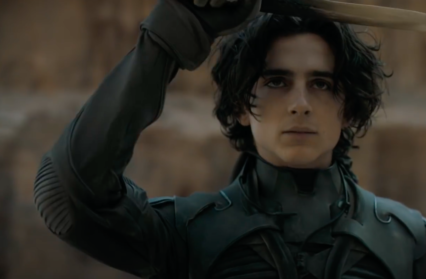Despite rave reviews and fan praise, James Lloyd found something missing from his cinematic experience of Hollywood’s latest sci-fi blockbuster, Dune. Here, he writes on the experience of returning to the big screen and why the film might just benefit from a second viewing.
I really wanted to love Dune. I was so excited to see Arrival and Blade Runner 2049 director Denis Villeneuve’s vision of Frank Herbert’s science fiction epic, a novel that I paradoxically knew nothing about. It’s cult following and reputation as one of the foundations of the genre preceded it, and as a lover of science fiction I knew this would be the film to return me to the cinema. I hadn’t been to the cinema for nearly a year and a half, having spent that time watching films from the unrestricted space of my home. I wanted to be immersed in a story and world that was epic and inspiring. Before seeing Dune in the cinema I had listened to Hans Zimmer’s score and the trailers promised a more dark, serious odyssey that could rival Star Wars. I knew it would be a film of great performances too, with Timothée Chalamet as the leading character Paul Atreides, Zendaya as the mysterious Chani, and supporting roles by Oscar Isaac, Rebecca Ferguson, Stellan Skarsgård, Josh Brolin, Jason Momoa and more. But when I came out of the cinema I almost felt… bored? A feeling that was as disappointing as it was confusing. I can’t help but feel like it didn’t quite deliver, and yet I find myself eagerly anticipating the now confirmed part 2.
I know nothing about Frank Herbert’s novel and have no interest in comparing the film to the source material. Although I am confident Villeneuve was faithful to the source material, adaptations to the screen always require changes, exclusions. The novel has the space and time to build things that the film cannot, and the value of a film should not rely on the knowledge of anything external to it. Many people will come to see this film this way. Dune is the first of a possible trilogy following the hero’s journey of Paul Atreides, heir of House Atreides, one of the great houses. He is being trained in the way of the Voice, and has dreams, visions of the planet Arrakis and a Freman girl named Chani. Paul’s father Leto (Oscar Isaac) is summoned by the Emperor of the galactic Imperium to take over control of Arrakis and its Spice production. Spice is crucial to the Imperium as it enables space travel, but to the Freman natives of Arrakis it is a life extending, mentally boosting drug, through which long exposure has turned their eyes blue. The great honour of being charged with Spice production is undermined by a jealous Emperor who fears the growing power of House Atreides. Previously charged with Spice production and the oppression of the Freman, House Harkonnen conspires with the Emperor to ensure House Atreides fails. But the mysterious Bene Gesserit cult has its own designs, laying out a path for Paul to become the Lisan Al-Gaib who will liberate Arrakis and beyond.
Can I really say I was bored? There is so much to love about this film. There were times watching Dune where my eyes widened, eyebrows raised with awe at what I was seeing. You are guaranteed a beautiful film with Denis Villeneuve as Director and this is arguably his best work. In collaboration with Greig Fraser as director of photography, every frame is rich with foreboding atmosphere, a contrast between the dark interiors of infinite installations and palaces to the blazing bright desert of Arrakis. Layered into these images is this biblical, Babylonian feel that recalls the epics of Spartacus, Lawrence of Arabia and Ben Hur. Always in the shots the characters provide a sense of scale to the locations, dwarfed by the dunes, spacecraft or sand worms that loom over them. Fires raging in a night time desert layer in the tragic imagery of Iraq and Kuwait’s burning oil fields, oil being very comparable as a fuel to the Spice of Arrakis. Each shot lingers on the screen, allowing you to fully absorb it, its scale and meaning. Much time has passed since I saw Dune and the imagery keeps returning to me, haunting me.
Everything I saw on screen was beautiful. The design of the locations and spacecraft were of a classic retro sci-fi style with a clean aesthetic. Each planet and their cultures have distinct architecture and ship design that subtly tell a story. The Atreides palace on Caladan feels distinctly oriental, minimalist interiors with circular windows and ancient bonsai trees. Yet house Atreides itself evokes a Greco-Roman legacy, their totem being the bull, the curled hair of Leto and Paul, their clothes of a western design. House Atreides are not native to Caladan but the world’s overlords. The Freman stillsuits and billowing robes indicate a native society that is incredibly well adapted to their homeworld. The Harkonnen architecture and suits are more distinctly evil, with dark colours and white, underworld skin. The vast Harkonnen mothership seems to mirror the mawr shape of the giant sandworm, another all consuming force trawling the desert for the uninitiated. The scale of the sandworms is always made truly monstrous, dwarfing people and machinery. They have no face, their million teeth bristle in a black mawr of indifference. All effects make the world of Dune, its politics and desolate landscape a ruthless and unforgiving place. However beautiful, the walled city of Arrakis requires as much caution to navigate its danger as the dunes that surround it. Nowhere is safe.
Hans Zimmer’s score emphasises this sense of foreboding and danger. ‘The Herald of Change’, heard early in the film as the Emperor’s Herald comes to ceremoniously request House Atreides to take control of Arrakis, makes this moment not glorious but melancholic, and brings a tragic, fatal nobility to the scene. The themes of House Atreides resonate through the film, punctuated by their battle bagpipes, proud and defiant. Each faction carries its own themes, the cultish whispers and canto’s of the Bene Gesserit work under your skin like the power of the voice they wield; the throat singing of the Sardaukar, the Emperor’s Blades; House Harkonnen with ominous silence. The sounds of the desert too, and its Freman inhabitants, the indian bamboo flute, singing, and the hissing of sand on the dunes. While much of the score is dark and foreboding, the music of Chani, the Freman girl that Paul dreams of, is elusive and mysterious. There is a calm peacefulness that is nurturing, yet its themes are uncertain. Is Chani friend or foe?
All of this creates a rich experience, and yet in my first viewing of this film in the cinema I remained at a surface level of immersion. The sign of a great film is the loss of all sense of time. You become so absorbed in the story unfolding before you that when the credits roll, you cannot believe two and half hours have passed. Throughout my first viewing I did not experience this.
It was my first time returning to the cinema since July last year, in which I saw Tenet in a brief easing of restrictions. Having become used to consuming films and streaming from home, it was a distracting experience watching a film in an environment that had become so unfamiliar. Surrounded by whispering, rustling strangers, it was difficult to settle in. The lights only dim, so an awareness of the people around me kept me locked in the cinema. I watched Dune for the second time by streaming from HBO Max, and while the screen size and sound quality in particular was lessened, I was able to relax into the film and immerse myself in a way I was unable to do in the cinema. Maybe this is a personal issue for me, but I’m sure I won’t be the only one who finds the transition back to the cinema a difficult one, if they decide to transition at all. Dune is an epic film that is best experienced on the big screen, but, I was continually made aware of why streaming has become so popular.
Dune has been aptly described as a slow burner, too. On my first viewing, I believed this would be a stand alone film akin to Blade Runner 2049 in length and scale. I was totally unaware that this film would be the first of a 2 or 3 part series, something that wasn’t made clear in the film’s trailers. On my first viewing I was constantly waiting for the film to begin. There was the sense of watching a long first act which, in knowledge of a second film makes sense, but was very disorientating when ignorant of that. It made watching strangely uncomfortable as I tried to figure out where I was in the story, and made me realise how much we rely on story structure to enjoy a narrative. We need a defined beginning, middle and end, and though on second viewing these were present, it all felt like a set up for Paul to take his first steps on his hero’s journey, which only begins as the credits roll.
There was a lot of setting up to do. Villeneuve has admirably distilled down a vast and detailed universe with scores of characters, worlds, factions, houses, power struggles and politics. Without knowledge of the source material, it’s done well, with each detail contributing to the story and the narrative it is building towards. Yet it was still a lot to digest in one viewing, and at times felt like it overshadowed Paul’s story. Paul is the main character, and yet at times it felt as though he lacked presence and agency in the story unfolding in this film. Events naturally unfold, not because of Paul’s actions but because of his existence, an existence that threatens the higher powers. He has a character arc, but one that lacks real character defining choices, reactions under pressure that reveal a true nature beneath his titles and responsibilities. As this is effectively a first act, he only really begins to actively pursue a goal towards the end of the film, which left me feeling excited for the second installation but lacking an investment in his character through this film.
With the monumental task of world building, there was little room to develop the characters that make you emotionally invest in the story playing out before you. There was no time to demonstrate why House Atreides are the good guys for example, with no discernible goal or worldview beyond a noble allegiance to the Imperium. The film had stakes, with characters set to win or lose, but there is a sense of inevitability to everything we see on screen, as though none of the characters have any influence over what is unfolding. Part 2 of the series will likely develop this and focus more on Paul as he undertakes his hero’s journey, but each film should feel complete in its own right, as does The Force Awakens or The Matrix. Comparisons too can be made to Game of Thrones, in which its author George R.R. Martin was heavily influenced by the political manoeuvring of Frank Herbert’s 1965 novel. The resemblances are stark (pun intended) and over a series of thick books and then 8 seasons of television, the web of political complexity that Martin weaves strangely makes Dune feel simple, almost rushed. Perhaps it’s not fair to make the comparison to a television series, which like the novel has much more time than the film. But most people have the Red Wedding traumatically seared into their memory, a memory so strong because of the hours we were allowed to emotionally invest in the characters, their wants and needs.
My grandpa was a film editor who used to base his editing on the knowledge that people only give a film one opportunity. I believe this is true, which is a shame because to truly appreciate the grandeur of Dune, it is best to see it twice. Perhaps it’s just me – and honestly I hope it is – but there is almost too much information to be absorbed in one sitting, and having some familiarity with it on second viewing really allows both the film and ourselves to breathe. It’s unfair to say Dune is boring, but the sheer volume of set up means Paul’s story only begins at the end, which undermines the artistic brilliance of the film as a whole. Most reviews of Dune have been without fault, and though I disagree that it is without flaws, I would recommend Dune to any lover of science fiction and fantasy. The story has only just begun.
Dune is out in cinemas now.
James Lloyd is a regular contributor to Wales Arts Review.














